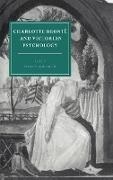Read more
Klappentext This ground-breaking study successfully challenges the traditional tendency to regard Charlotte Bronte as having existed in a historical vacuum, by setting her work firmly within the context of Victorian psychological debate. Based on extensive local research, using texts ranging from local newspaper copy to the medical tomes in the Reverend Patrick Bronte's library, Sally Shuttleworth explores the interpenetration of economic, social and psychological discourse in the early and mid nineteenth century, and traces the ways in which Charlotte Bronte's texts operate in relation to this complex, often contradictory, discursive framework. Shuttleworth offers a detailed analysis of Bronte's fiction, informed by a new understanding of Victorian constructions of sexuality and insanity, and the operations of medical and psychological surveillance. Zusammenfassung Using texts ranging from local newspapers to medical tomes, Sally Shuttleworth explores Victorian constructions of psychology, sexuality, and insanity, and offers a reading of Brontë's fiction informed by a new understanding of the complex, often contradictory, psychological debates of her time. Inhaltsverzeichnis Acknowledgements; Introduction; Part I. Psychological Discourse in the Victorian Era: 1. The art of surveillance; 2. The Haworth context; 3. Insanity and selfhood; 4. Reading the mind: physiognomy and phrenology; 5. The female bodily economy; Part II. Charlotte Brontës Fiction: 6. The early writings: penetrating power; 7. The Professor: 'the art of self-control'; 8. Jane Eyre: 'lurid hieroglyphics'; 9. Shirley: bodies and markets; 10. Villette: 'the surveillance of a sleepless eye'; Conclusion; Notes; Index.

